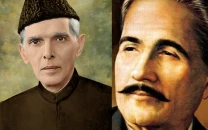National space conference: ‘Lack of awareness leads to lack of support’
Possibilities in the local space programme, upcoming projects discussed.

National space conference: ‘Lack of awareness leads to lack of support’
Revenue from satellite services in Pakistan grew by 6 percent from 2006 to 2011, despite several challenges to the country’s space programme. With some effort, the situation can further imrpove.
With such encouraging figures floating around, the second day of the ongoing National Space Conference was about the work being done in the local space techonology scene. Organised by SUPARCO, the event is being held at Comstech Auditorium.
“All segments related to the satellite industry posted growth in the last five years with a total revenue of Rs177.3 billion,” said Dr Muhammad Riaz Suddle, member of the space electronics program at SUPARCO. But the demand mostly lies with satellite services not the hardcore engineering side of space technology, he added.
Suddle said the launch of Pakistan’s first communication satellite, Paksat-1R, in August 2011, has created a rise in the television broadcast industry, which uses the satellite for transmission and news gathering.
Paksat-1R has also created business opportunities for Direct-to-Home television and High Definition TV in Pakistan, he said.
Apart from the positives, the factors hampering the growth of the sector were also discussed.
In addition to technical challenges, the country’s space programme faces a dearth of qualified individuals, a nonexistent private space sector and shortage of facilities. These problems are compounded by the absence of moral support from the public, said an expert. “Lack of awareness about space technology among the masses leads to lack of support for the country’s space programme,” he said.
One session of the day was devoted to discussions about the use of satellite remote sensing for socioeconomic benefits.
Remote sensing is a technique by which satellites detect signals from Earth to classify objects and map areas on ground. These signals are usually emitted by the sensors on the satellite and detected once they are reflected back off the surface of Earth.
SUPARCO is using remote sensing to monitor crops, develop inventories of water courses in the country, make forest cover assessments and measure environmental changes, said another official.
Crop monitoring involves estimating the area and yield of crops in the country as well as measuring drought conditions. Together, this operation can help address issues of food security in Pakistan.
One of the most important applications of SUPARCO’s remote sensing is disaster monitoring. In a presentation on the topic, Zuhair Bokhari said SUPARCO has established early warning systems based on satellite data and provides support and damage assessment services to national and regional agencies in the case of a disaster.
Bokhari said SUPARCO has created an application for floods that automatically calculates the extent of inundated roads, highways and settlements based on satellite data and other stats about the affected area. It also generates “rapid analysis” maps and a “detailed assessment” using high resolution satellite images in the wake of a disaster, according to the official.
The conference ends on Wednesday.
Published in The Express Tribune, September 19th, 2012.



















COMMENTS
Comments are moderated and generally will be posted if they are on-topic and not abusive.
For more information, please see our Comments FAQ